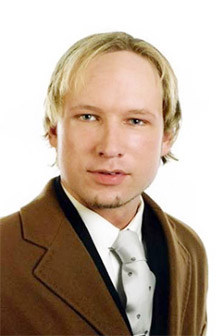(Reuters) – The man suspected of Norway’s gun and bomb massacre liked guns and weight-lifting, had belonged to an anti-immigration party and opposed multi-culturalism, Islam and the “cultural Marxists” of the establishment.

Police said Anders Behring Breivik, detained after 85 people were gunned down at a youth camp and another seven killed in a bomb attack on Friday, was previously unknown to them and people who knew him said he was quiet, if intense.
It was unclear what unleashed the bloodshed, though news agency NTB said Breivik was a member of a gun club and legally owned firearms. At the shooting, police said Breivik carried a pistol and an automatic weapon.
“He was rather introverted at school, even though he was a good student,” said Michael Tomola, who knew Breivik from the age of 13 to 16 at the school they went to in an Oslo suburb.
“I’m very surprised by this [attack]. I had a good impression, although he became very engaged in subjects he cared for. He got very extreme about things he cared for,” Tomola added to Reuters.
His Internet activity traced so far included no calls to violence. A Facebook page set up last week included a variety of interests such as hunting and political and stock analysis.
His tastes in music included classical and trance, a hypnotic form of dance music.
The profile veered between references to political philosophers and gory popular films, TV shows and video games.
In comments from 2009-2010 to other people’s articles on website www.document.no, which calls itself critical of Islam, Breivik criticized European policies of trying to accommodate the cultures of different ethnic groups.
Norway has traditionally been open to immigration, which has been criticized by the Progress Party, of which Breivik was for a short time a member. The Labour Party, whose youth camp Breivik attacked, has long been in favour of immigration.
“What most people still do not understand is that the ongoing Islamicisation of Europe cannot be stopped before one gets to grips with the political doctrine which it make possible (and the individuals which front these doctrines),” he wrote in October 2009.
Another entry dated February 16 last year said: “According to two studies, 13 per cent of young British Muslims aged between 15 and 25 support al Qaeda ideology.”
Breivik wrote he was a backer of the “Vienna School of Thought,” which was against multi-culturalism and the spread of Islam. He also wrote he admired Geert Wilders, the populist anti-Islam Dutch politician, for following that school.
Wilders said in a statement yesterday: “I despise everything he stands for and everything he did.”
Not known to police
Nina Hjerpset-Ostlie, a contributing journalist to the website, said she had met Breivik at a meeting in late 2009. He seemed keen to develop the website as a way to counter what he saw as prevailing trends of multiculturalism.
“The only thing we noticed about him is that he seemed like anyone else and that he had some very high-flying, unrealistic, ideas about marketing of our website,” she told Reuters.
She said Breivik was active on the website in late 2009, but became less so during of 2010.
Police searched an apartment in an Oslo suburb on Friday, which neighbours said belonged to Breivik’s mother.
“It is the mother who lives there. She is a very polite lady, pleasant and very friendly,” said Hemet Noaman, 27, an accounting consultant who lives in the same building in an expensive part of town.
“He often came to visit his mother but did not live here.”
Oslo Deputy Police Chief Roger Andresen would not speculate on the motives for what was believed to be the deadliest attack by a lone gunman anywhere in modern times.
“He has never been under surveillance and he has never been arrested,” Oslo deputy police chief Roger Andresen told a news conference.
Populist party member
Breivik, who attended a middle class high school called Handelsgym in central Oslo, had also been a member of the Progress Party, the second-largest in parliament, the party’s head of communications Fredrik Farber said.
He was a member from 2004 to 2006 and in its youth party from 1997-2006/2007.
The Progress Party wants far tighter restrictions on immigration, whereas the centre-left government backs multi-culturalism. The party leads in some public opinion polls.
A politician who met Breivik in 2002-2003, when he was apparently interested in local Oslo politics, said he did not attract attention.
“I got the impression that he was a modest person … he was well dressed, it seemed like he was well educated,” Joeran Kallmyr, 33, an Oslo municipality politician representing the Progress Party, told Reuters.
“I don’t remember anything special about him … I don’t remember if he had any particular political opinions, he wasn’t really a person who took part of political debate.”
Progress leader Siv Jensen stressed he had left the party.
“It makes me very sad that he was a member at an earlier point. He was never very active and we have a hard time finding anyone who knows much about him,” she told Reuters.
Farber said: “He was a member and had some participation in the local chapter in Oslo but stopped paying his membership dues and ceased being a member in 2006 or 2007.”
Breivik was also a freemason, said a spokesman for the organization. Freemasons meet in secretive fraternal groups in many parts of the world.
